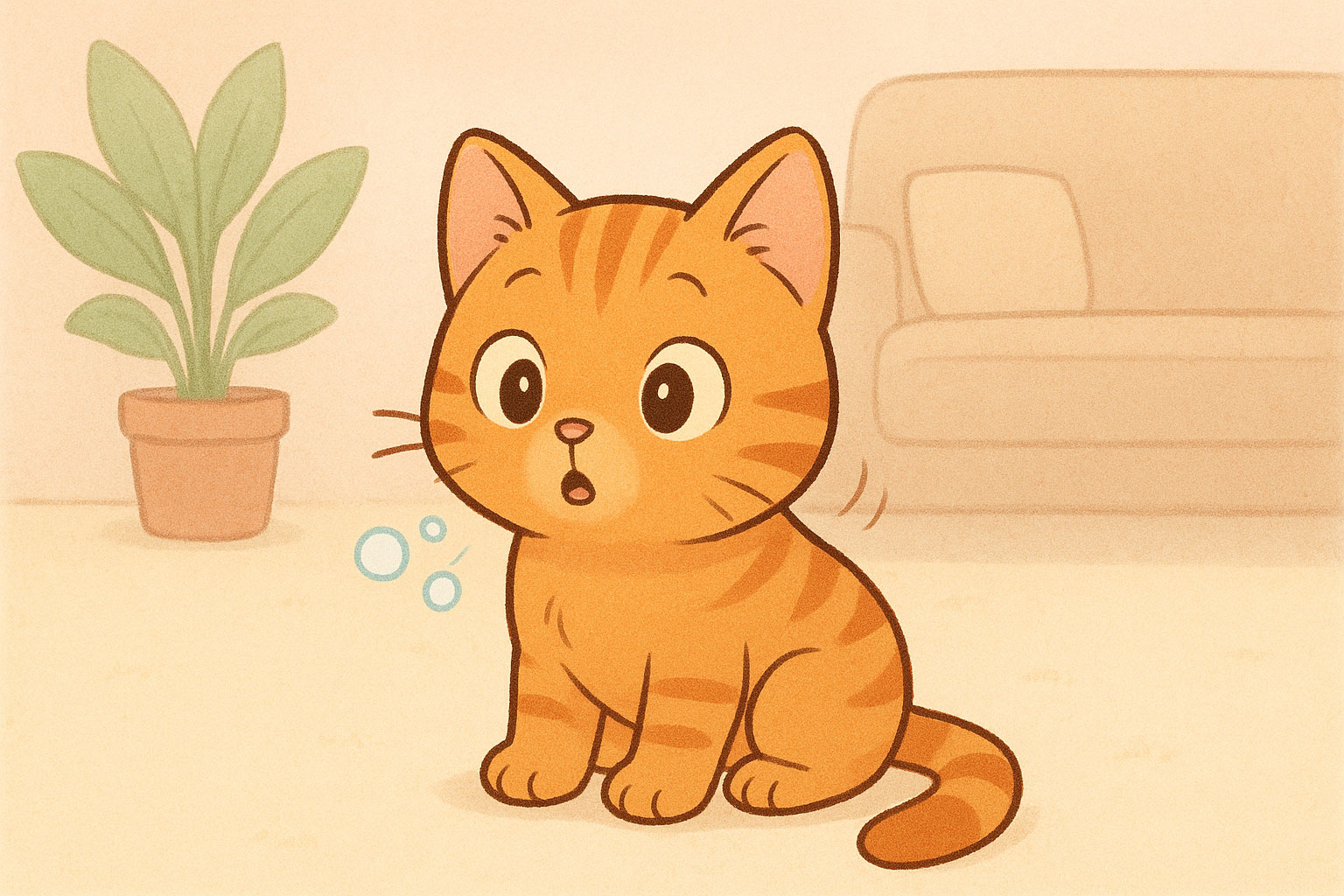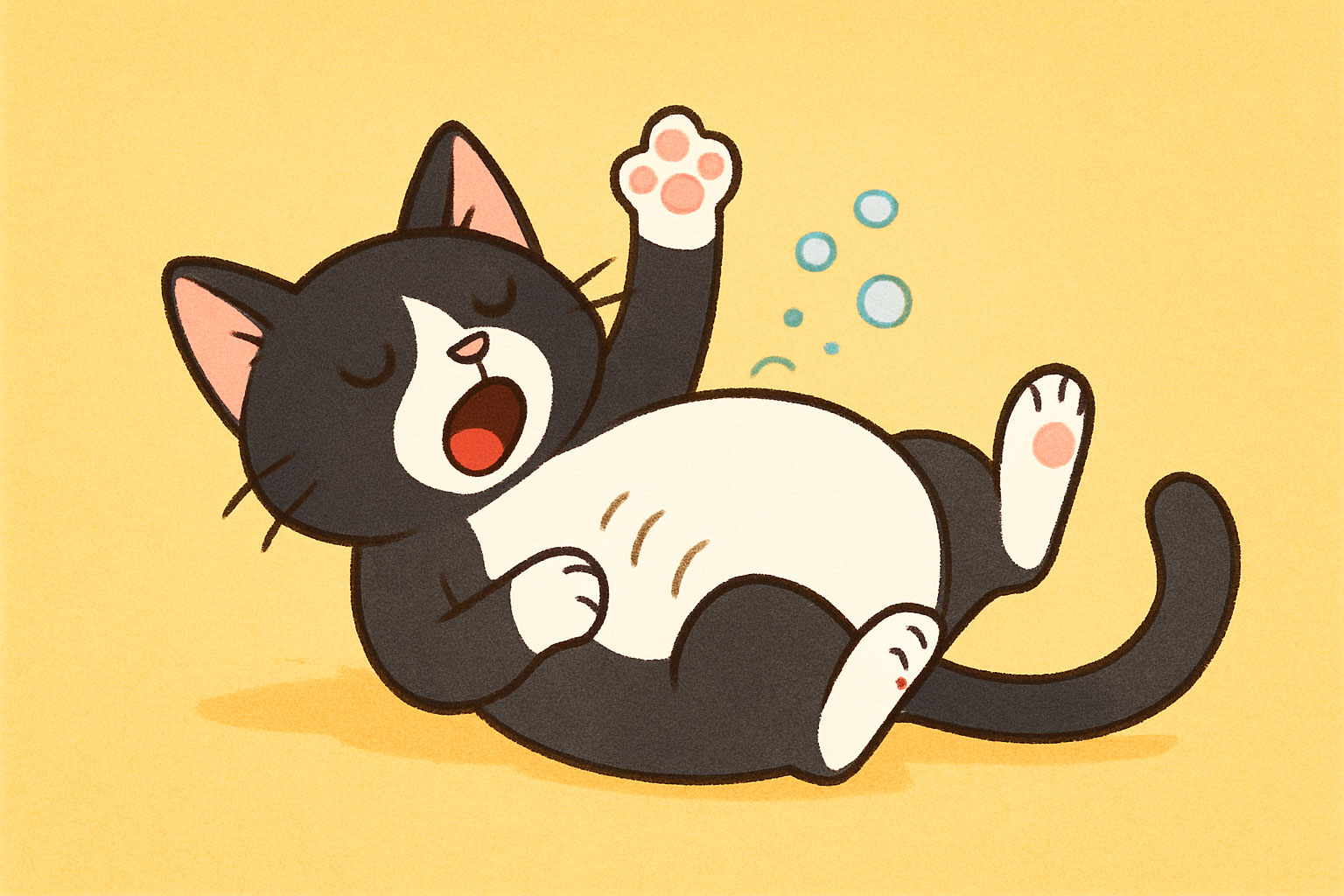You might have thought, “Do cats get the hiccups like people do?” if you’ve ever seen your cat make strange little jerking movements or soft “gulping” sounds. Hiccups are common and usually not dangerous in people, but they’re not as common in cats. But cats can also have episodes that are like hiccups. If you know what causes these strange times and whether they are normal, you can take better care of your pet. We’ll talk about what cat hiccups are, how they’re different from human hiccups, and when they might mean something more serious in this post.
Can Cats Actually Get Hiccups?
Yes, cats can get hiccups, but it’s not as common or easy to see as it is in people. When the diaphragm, the muscle that helps you breathe, suddenly contracts, you get a hiccup. The vocal cords usually close quickly after this involuntary spasm, which makes the “hic” sound.
Hiccups in cats are usually much quieter and less noticeable. You might see a little twitch in their belly or hear a soft sound when they breathe. Most of the time, these episodes don’t last long and aren’t a cause for concern. But it’s important to know the difference because cats can also show similar signs when they cough, sneeze, or gag.
Kittens are more likely to get hiccups because their bodies are still growing and they eat too quickly. Adult cats can also get them, usually because of small annoyances or eating too quickly.

How Cat Hiccups Are Different from Human Hiccups
Both cats and people can get hiccups when their diaphragm spasms, but they look and sound different.
In Humans:
- Most of the time, hiccups are loud and make a “hic” sound.
- Too much food, carbonated drinks, or sudden excitement are common causes.
- Easy to spot and sometimes lasts for a long time.
In Cats:
- Hiccups are usually much quieter, like a soft gulp or a small twitching of the stomach.
- It may look like small spasms or light, rhythmic jerks.
- People often think it’s coughing, retching, or even purring.
- Kittens often have this because their digestive systems aren’t fully developed yet.
The biggest difference is that cat hiccups are very quiet. A lot of pet owners don’t even notice them unless they’re really looking. Also, cats can’t tell us how they feel, so it’s important to watch them closely to tell the difference between hiccups and other problems like hairballs or breathing problems.
What Causes Hiccups in Cats?
Cat hiccups are usually not dangerous and happen for the same reasons as in people, usually because the diaphragm is slightly irritated. But there are a few things that can make your cat hiccup:
1. Eating Too Fast
One of the most common reasons cats get hiccups is because they eat too quickly. When a cat eats and swallows air, it can irritate the diaphragm and cause hiccups, especially in kittens who don’t know how to slow down.
2. Hairballs
Cats groom themselves all the time, and while they do, they often eat loose hair. This can build up and make hairballs, which can hurt the throat or digestive system. When you try to pass or cough up a hairball, the movement or irritation can sometimes look like hiccups.
3. Stress or Excitement
When a cat gets stressed, anxious, or excited all of a sudden, it can change how they breathe, which can cause mild hiccup-like spasms in some cats.
4. Underlying Medical Conditions
Frequent hiccups, though uncommon, may indicate:
- Asthma or problems with breathing
- Discomfort in the stomach and intestines
- Worms or parasites
If your pet has hiccups often or along with coughing, vomiting, or being sleepy, it’s best to see a vet to make sure there aren’t any other issues.
How to Tell if Your Cat Is Hiccuping or Coughing
Hiccups and coughing in cats can look and sound the same, with sudden body movements and strange noises. However, it’s important to know the difference, especially if your cat might be sick.
Signs Your Cat Is Hiccuping:
- A soft, rhythmic twitching of the chest or abdomen
- Sounds like soft gulps or clicks
- It usually happens when you’re resting or right after eating.
- The episode is short and doesn’t seem to bother the cat. There are no signs of pain or distress.
Signs Your Cat Is Coughing:
- Sounds that are louder and more forceful, like choking or gagging.
- When you cough, your neck may stretch forward.
- Can make mucus, saliva, or even throw up
- Often with heavy breathing or wheezing
- Can happen a lot and seem more intense or tiring
If you’re not sure if your cat is coughing or hiccupping, try to film it and watch closely. If your cat does this a lot or seems to be in pain because of it, you should always call your vet for a professional opinion.

Are Cat Hiccups Normal or a Reason to Worry?
Most of the time, cat hiccups are normal and nothing to worry about. Like people, dogs can get hiccups from small, everyday things like eating too fast or swallowing air. These episodes usually go away on their own in a few minutes and don’t need any treatment.
But if you get hiccups a lot or with other symptoms, you should see a doctor. If you have hiccup-like episodes that happen over and over again or last for a long time, they could be a sign of a more serious problem, like breathing problems, stomach irritation, or even parasites.
Warning Signs to Watch For:
- Hiccups that happen every day or more than once a day
- Wheezing, coughing, or having trouble breathing
- Throwing up or trying to get rid of hairballs often
- Loss of appetite, lethargy, or changes in behavior
If your cat shows any of these signs, you should take it to the vet to make sure it doesn’t have any health problems.
When to See a Vet
If your cat has hiccups every now and then, they are usually not a big deal, especially if they are short and your cat seems otherwise happy and healthy. But if the episodes happen often, are very bad, or come with other symptoms, it could mean that there is a problem that needs to be looked at by a professional.
You Should See a Vet If:
- Hiccups last more than a few minutes or happen more than once a day.
- Your cat is having trouble breathing, wheezing, or throwing up.
- There is throwing up, not wanting to eat, or losing weight quickly.
- You hear coughs that sound loud or wet instead of soft hiccups.
- Your cat looks tired, anxious, or in pain.
If your pet has asthma, digestive problems, or throat irritation, your vet may do a physical exam and, if necessary, run tests. Most of the time, hiccups are not harmful, but it’s always better to be safe than sorry when it comes to your pet’s health.
Conclusion
It might surprise you, but cats can get hiccups. They’re usually very small and not a big deal. Most of the time, cats get hiccups from simple things like eating too quickly or being a little irritated, especially when they are young. But any responsible cat owner should still be able to tell the difference between harmless hiccups and signs of a bigger problem.
If your cat only hiccups once in a while and seems perfectly healthy otherwise, you don’t need to worry. But if the episodes happen often or are accompanied by other symptoms, don’t wait to see your vet. The best way to keep your cat happy and healthy is to pay attention and stay informed.

